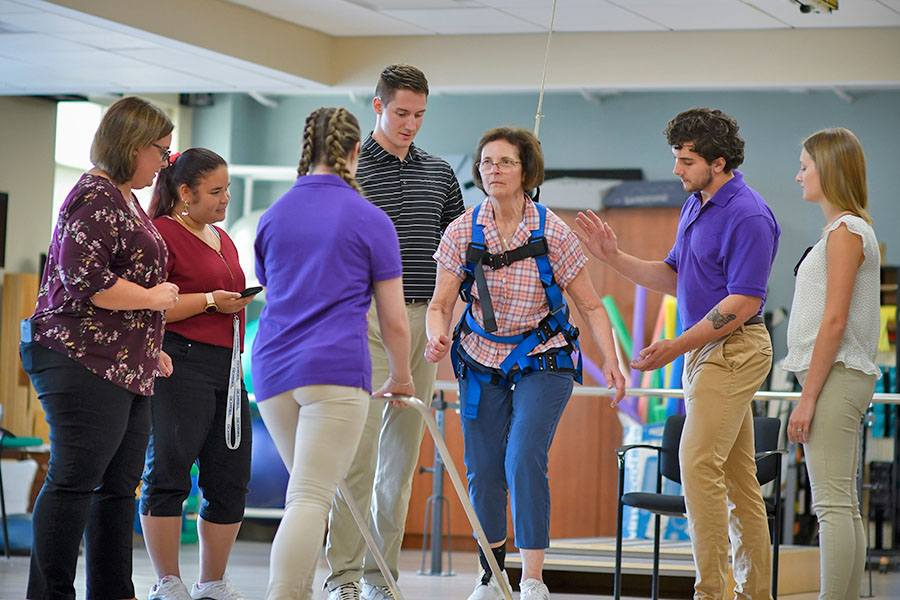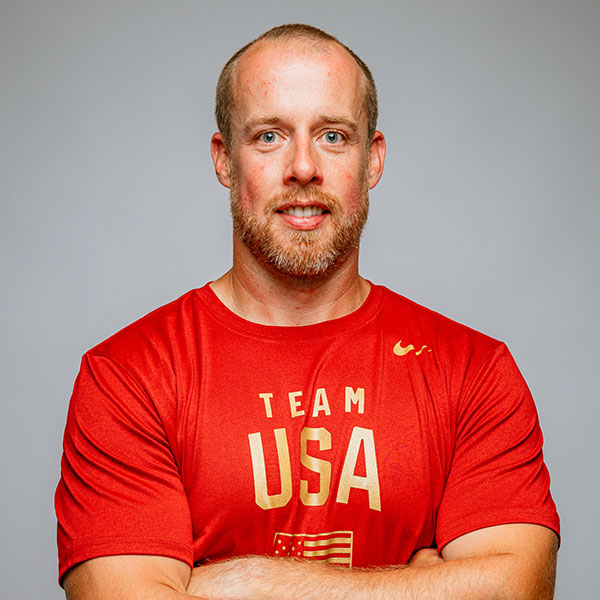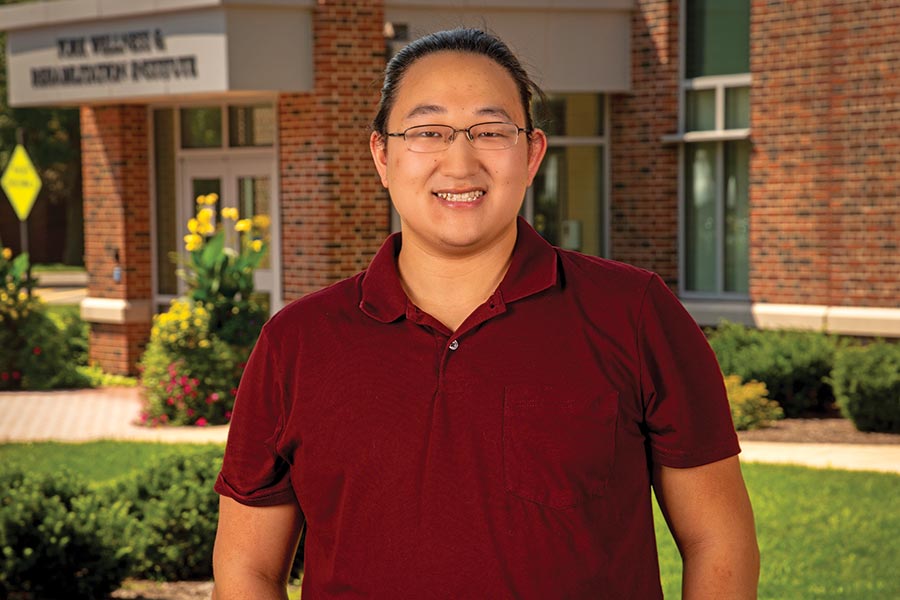Physical Therapy
Doctor of Physical Therapy
"It does not matter how slowly you go, as long as you do not stop." — Confucius
- This highly competitive program offers multiple opportunities for hands-on learning through courses in our faculty-supervised clinics, plus full-time clinical affiliations around the country.
- Learn person-centered care that changes lives — of students, patients, and their families.
- The doctor of physical therapy program at Nazareth University — the only one in the Rochester region — is accredited by the Commission on Accreditation in Physical Therapy Education.

Highlights
Full-time, day-time schedule
Complete in 3 years for graduate students, 6 years for freshmen
Integrated clinical education starts your first semester in on-campus PT clinics
Program is Ideal For
- Academically strong students driven to succeed who have a bachelor's degree and have completed these prerequisites with a grade of B or better by the start of classes (summer): 8 credits of anatomy and physiology, 8 credits of chemistry, 8 credits of physics (all sciences include labs), 3 credits of statistics (psychology-based preferred), 6 credits of psychology (one course in developmental psychology preferred).
- Strong academic performance is paramount for admission; your undergraduate major is secondary.
What to Expect
- Develop excellent hands-on and clinical reasoning skills, effective communication strategies, and the ability to collaborate interprofessionally through experience.
- Experience integrated clinical education starting your first semester, working with patients/clients in our on-campus physical therapy clinics specializing in multiple sclerosis, neuromuscular diseases, orthopedic injuries, prosthetics, wellness, and pediatrics, under the supervision of faculty. Immediately apply material learned in lecture and lab to ensure mastery.
- Be part of a rich tradition of providing inter-professional pro-bono service to the local community by working collaboratively with occupational therapy, speech therapy, art therapy, and music therapy students in our numerous on-campus clinics.
- Use cutting-edge equipment to help patients/clients regain mobility. Research at Nazareth guided the development of Gorbel's SafeGait trainer.
- Gain further experience through four full-time clinical internships, totaling 32 weeks, at any of nearly 500 sites around the country with which Nazareth University has official agreements.
- Work closely with faculty in classes, labs, clinics, and during research projects. Faculty members have an open-door policy and students often stop by to talk about physical therapy.
- Learn human anatomy through cadaver dissection in our on-campus Anatomy & Physiology Lab.
- Conduct research with faculty mentors, attend lab classes, and help people with movement dysfunctions using high-tech equipment in Nazareth's motion analysis lab.
- Choose elective courses in unique applied clinical topics.
- You have the option to get specialized preparation in working with school-age children with autism through Nazareth's Interdisciplinary Specialty Program in Autism (I-SPAN) specialization.
- You have the option to include an early-intervention interprofessional concentration (track): Rochester Scholars for Early Intervention helps you develop specialty knowledge and skills to be a strong advocate for young children and their families.
- Frequently asked questions about the Physical Therapy program.

Why Nazareth?
"I had degrees in athletic training and kinesiology and had worked with the Buffalo Sabres organization and in different roles from athletic training to strength and conditioning for the Amerks. I wanted to further my career in the rehab setting, and a doctorate in physical therapy was the way to do that. My clinical experiences were great. I knew I wanted to work in a certain setting and I was able to navigate in that direction. Limitless — the company I’m working for now — was one of my clinicals. I also really bonded with my Naz classmates, who are still friends. A Naz professor supported my idea to start the Performance Therapy Club, where we brought in speakers working in professional sports or with elite athletes. This allowed students to network and learn from those professionals. My career has bloomed. What I really enjoy is helping the people who come see me. Especially when they graduate from PT, seeing that smile as they walk out the door, living life to the fullest."
— Bryan Gardner '23G, DPT, PT, ATC, worked with the USA Rugby Sevens National Team as they competed in the 2024 Olympics and works as a physical therapist at Limitless Physical Therapy Specialists outpatient orthopedic clinic in the Rochester, New York, area.
Value of Your Degree
98%
two-year graduation rate, meaning 98% of those who started the professional program successfully completed it within the expected time frame, 2023–2024.
89%
first-time two-year pass rate on the National Physical Therapy Exam, 2023-2024.
99%
ultimate two-year pass rate on the National Physical Therapy Exam, 2023-2024.
100%
employment rate. Of those seeking employment, all were employed within six months of passing the licensure exam, 2023–2024.
Growth
Physical therapy is one of the fastest-growing roles in health care. Jobs are projected to grow 14 percent from 2023 to 2033, much faster than the average for all occupations, according to the U.S. Occupational Outlook Handbook.
$99,710
Average salary (as of 2023)
Flexibility
Physical therapists can practice in acute care, rehabilitation hospitals, sub-acute rehabilitation facilities, outpatient clinics, early intervention programs, schools, wellness/prevention programs, home health, and research centers.
100%
100% of DPT students receive financial assistance. Graduate students qualify for Merit-Based Scholarships ranging from $1,000–$10,000 per year depending on academic performance overall and in science coursework.
Affordability
Grants, scholarships, veterans benefits, loans, and undergraduate loan forgiveness are options for paying for this grad degree. Making grad school affordable »
Elective Course Examples
- Advanced Applied Anatomy
- Advanced Neurology
- Advanced Orthopedics
- Advanced Pediatrics
- Advanced Sports PT
Program Director
Andrew Opett, PT, DPT, OCS
Clinical Associate Professor and Department Chair
For questions, contact PT@naz.edu
The Physical Therapy Program at Nazareth University is accredited by the Commission on Accreditation in Physical Therapy Education (CAPTE), 3030 Potomac Ave., Suite 100, Alexandria, Virginia 22305-3085; telephone: 703-706-3245; email: accreditation@apta.org; website: http://www.capteonline.org.

Alumni Spotlight
"Nazareth's DPT program prepared me well — to work in a variety of settings with a wide base of knowledge and skills, to be a critical thinker and a lifelong learner, and to value networking. One of the biggest factors about Nazareth is the smaller class sizes. The professors know who you are on an individual level and work with you to ensure your success academically and in the profession. Through connections with professors, I have been able to travel and speak at two different conferences and secure at least two of my professional positions. Throughout my DPT program, research related to diversity, equity, and inclusion issues was a passion of mine, and I'm now glad to continue it at a larger scale as part of the American Physical Therapy Association Pediatrics Diversity, Equity, and Inclusion committee."
— Matt Krieg '20, '22G, a full-time school-based physical therapist for Rochester City School District, plus a physical therapist for Rochester General Hospital, Monroe Community Hospital, and Unity Living Center.